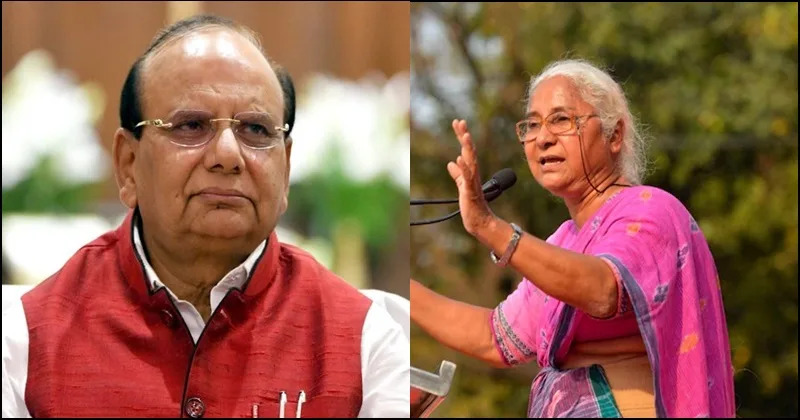The Saket Court in Delhi recently delivered a significant verdict, convicting Medha Patkar, a prominent leader of the Narmada Bachao Andolan, in a criminal defamation case. Delhi’s Lieutenant Governor VK Saxena filed this case. Metropolitan Magistrate Raghav Sharma sentenced Medha Patkar to five months in prison and imposed a fine of 10 lakh rupees, which she must pay to VK Saxena. Considering Medha Patkar’s health, the court also ordered a 30-day suspension of the sentence’s duration.
Court’s Verdict
On May 24, the court found Medha Patkar guilty under Section 500 of the Indian Penal Code, which addresses criminal defamation. This legal provision stipulates that any individual who harms another person’s reputation through false statements can face a maximum imprisonment of two years.
The court thoroughly examined the evidence and determined that Medha Patkar had made baseless allegations against VK Saxena. These accusations were not only unfounded but also deliberately intended to tarnish Saxena’s reputation. Consequently, the court imposed a prison sentence and a substantial fine on Patkar, underscoring the severity of her actions.
Case History
The case originates from November 25, 2000, when Medha Patkar publicly accused VK Saxena of involvement in hawala transactions and labeled him a coward in an statement. Additionally, she alleged that Saxena had compromised Gujarat’s resources by mortgaging them to foreign interests.
These accusations directly impugned Saxena’s character and integrity, sparking a contentious legal battle that has spanned years. The accusations not only stirred public debate but also led to legal actions underscoring the complexities of defamation and the consequences of making unsubstantiated claims against public figures.
Medha Patkar’s Defense
In her defense, Medha Patkar asserted in court that VK Saxena had been consistently making unfounded and defamatory accusations against her since 2000. She further contended that in 2002, Saxena physically assaulted her, prompting her to lodge a First Information Report (FIR) in Ahmedabad. Patkar alleged that Saxena’s actions were motivated by corporate interests and his opposition to critics of the Sardar Sarovar Project.
Legal Proceedings
In 2001, VK Saxena initiated a criminal defamation lawsuit against Medha Patkar in an Ahmedabad court, alleging that her accusations tarnished his reputation. The Gujarat trial court acknowledged the case and began legal proceedings. However, in 2003, the Supreme Court intervened, transferring the jurisdiction from Gujarat to the Saket Court in Delhi for impartial adjudication.
The case endured a lengthy legal journey, culminating in Medha Patkar defending herself in 2011, steadfastly maintaining her innocence throughout the trial process. Notably, at the time Saxena pursued the case in Ahmedabad, he held the position of chairman at the National Council for Civil Liberties, underscoring his commitment to addressing issues of civil rights and integrity within the framework of Indian law.
This transfer of jurisdiction underscored the case’s national significance and the court’s determination to ensure fair and just proceedings despite the involved parties’ differing locations and public profiles.
Conclusion
The court’s ruling holds profound implications beyond the confines of law, resonating deeply in social and ethical dimensions. Medha Patkar’s unsubstantiated accusations against VK Saxena underscore the perilous impact of unfounded claims on individual reputations within society.
The case serves as a stark reminder of the ethical responsibilities accompanying public discourse, emphasizing the potential harm wrought by false allegations. Such incidents not only jeopardize personal integrity but also erode trust in public figures and institutions, crucial for a functioning democracy.
By adjudicating in favor of VK Saxena, the court reaffirms the importance of evidence-based scrutiny and ethical conduct in public statements. This verdict emphasizes that individuals must ground accusations, especially those with significant repercussions, in verifiable facts to safeguard against unwarranted reputational harm and uphold the integrity of public discourse.
ALSO READ: Religious conversions could turn India’s majority into a minority: Allahabad High Court
